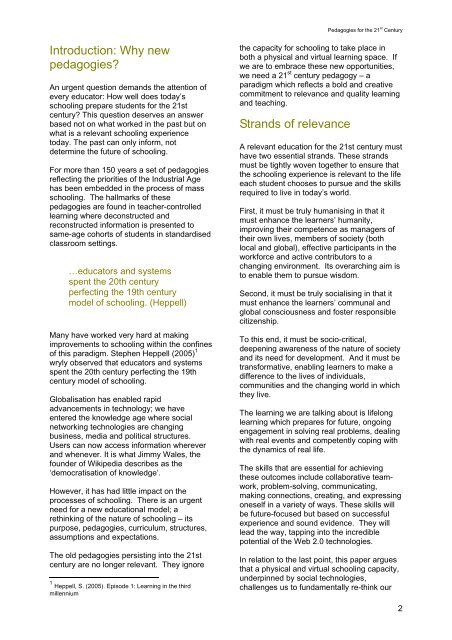pedagogies-for-the-21st-century
pedagogies-for-the-21st-century
pedagogies-for-the-21st-century
Create successful ePaper yourself
Turn your PDF publications into a flip-book with our unique Google optimized e-Paper software.
Pedagogies <strong>for</strong> <strong>the</strong> 21 st Century<br />
Introduction: Why new<br />
<strong>pedagogies</strong>?<br />
An urgent question demands <strong>the</strong> attention of<br />
every educator: How well does today’s<br />
schooling prepare students <strong>for</strong> <strong>the</strong> <strong>21st</strong><br />
<strong>century</strong>? This question deserves an answer<br />
based not on what worked in <strong>the</strong> past but on<br />
what is a relevant schooling experience<br />
today. The past can only in<strong>for</strong>m, not<br />
determine <strong>the</strong> future of schooling.<br />
For more than 150 years a set of <strong>pedagogies</strong><br />
reflecting <strong>the</strong> priorities of <strong>the</strong> Industrial Age<br />
has been embedded in <strong>the</strong> process of mass<br />
schooling. The hallmarks of <strong>the</strong>se<br />
<strong>pedagogies</strong> are found in teacher-controlled<br />
learning where deconstructed and<br />
reconstructed in<strong>for</strong>mation is presented to<br />
same-age cohorts of students in standardised<br />
classroom settings.<br />
…educators and systems<br />
spent <strong>the</strong> 20th <strong>century</strong><br />
perfecting <strong>the</strong> 19th <strong>century</strong><br />
model of schooling. (Heppell)<br />
Many have worked very hard at making<br />
improvements to schooling within <strong>the</strong> confines<br />
of this paradigm. Stephen Heppell (2005) 1<br />
wryly observed that educators and systems<br />
spent <strong>the</strong> 20th <strong>century</strong> perfecting <strong>the</strong> 19th<br />
<strong>century</strong> model of schooling.<br />
Globalisation has enabled rapid<br />
advancements in technology; we have<br />
entered <strong>the</strong> knowledge age where social<br />
networking technologies are changing<br />
business, media and political structures.<br />
Users can now access in<strong>for</strong>mation wherever<br />
and whenever. It is what Jimmy Wales, <strong>the</strong><br />
founder of Wikipedia describes as <strong>the</strong><br />
‘democratisation of knowledge’.<br />
However, it has had little impact on <strong>the</strong><br />
processes of schooling. There is an urgent<br />
need <strong>for</strong> a new educational model; a<br />
rethinking of <strong>the</strong> nature of schooling – its<br />
purpose, <strong>pedagogies</strong>, curriculum, structures,<br />
assumptions and expectations.<br />
The old <strong>pedagogies</strong> persisting into <strong>the</strong> <strong>21st</strong><br />
<strong>century</strong> are no longer relevant. They ignore<br />
1 Heppell, S. (2005). Episode 1: Learning in <strong>the</strong> third<br />
millennium<br />
<strong>the</strong> capacity <strong>for</strong> schooling to take place in<br />
both a physical and virtual learning space. If<br />
we are to embrace <strong>the</strong>se new opportunities,<br />
we need a 21 st <strong>century</strong> pedagogy – a<br />
paradigm which reflects a bold and creative<br />
commitment to relevance and quality learning<br />
and teaching.<br />
Strands of relevance<br />
A relevant education <strong>for</strong> <strong>the</strong> <strong>21st</strong> <strong>century</strong> must<br />
have two essential strands. These strands<br />
must be tightly woven toge<strong>the</strong>r to ensure that<br />
<strong>the</strong> schooling experience is relevant to <strong>the</strong> life<br />
each student chooses to pursue and <strong>the</strong> skills<br />
required to live in today’s world.<br />
First, it must be truly humanising in that it<br />
must enhance <strong>the</strong> learners’ humanity,<br />
improving <strong>the</strong>ir competence as managers of<br />
<strong>the</strong>ir own lives, members of society (both<br />
local and global), effective participants in <strong>the</strong><br />
work<strong>for</strong>ce and active contributors to a<br />
changing environment. Its overarching aim is<br />
to enable <strong>the</strong>m to pursue wisdom.<br />
Second, it must be truly socialising in that it<br />
must enhance <strong>the</strong> learners’ communal and<br />
global consciousness and foster responsible<br />
citizenship.<br />
To this end, it must be socio-critical,<br />
deepening awareness of <strong>the</strong> nature of society<br />
and its need <strong>for</strong> development. And it must be<br />
trans<strong>for</strong>mative, enabling learners to make a<br />
difference to <strong>the</strong> lives of individuals,<br />
communities and <strong>the</strong> changing world in which<br />
<strong>the</strong>y live.<br />
The learning we are talking about is lifelong<br />
learning which prepares <strong>for</strong> future, ongoing<br />
engagement in solving real problems, dealing<br />
with real events and competently coping with<br />
<strong>the</strong> dynamics of real life.<br />
The skills that are essential <strong>for</strong> achieving<br />
<strong>the</strong>se outcomes include collaborative teamwork,<br />
problem-solving, communicating,<br />
making connections, creating, and expressing<br />
oneself in a variety of ways. These skills will<br />
be future-focused but based on successful<br />
experience and sound evidence. They will<br />
lead <strong>the</strong> way, tapping into <strong>the</strong> incredible<br />
potential of <strong>the</strong> Web 2.0 technologies.<br />
In relation to <strong>the</strong> last point, this paper argues<br />
that a physical and virtual schooling capacity,<br />
underpinned by social technologies,<br />
challenges us to fundamentally re-think our<br />
2


